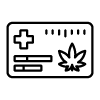Cannabis Laws in Pennsylvania

Fully Legalized for Adult Use?

Fully Legalized for Medical Use?

CBD only?

Decriminalized?
Disclaimer: This information is provided for general informational purposes only and may not reflect the most current legal requirements in Pennsylvania. Cannabislaws.global recommends you consult with a qualified local attorney or legal expert for accurate and up-to-date information. This information is not intended as legal advice and should not be relied upon as such. Use of this information is at your own risk.
Does Pennsylvania have a recreational use program?
No, recreational use is not legal in Pennsylvania.
Does Pennsylvania have a medical program?
Yes, medical cannabis is legal in Pennsylvania. Pennsylvania legalized marijuana on April 17, 2016, for medical use; however, as of 2023, the state had not authorized marijuana for recreational use.
This made medical marijuana legal and set up the Commonwealth’s medical marijuana program (MMP). Individuals in Pennsylvania who had valid medical reasons were allowed by law to properly obtain and utilize medical marijuana. The Medical Marijuana Act also gave the Pennsylvania Department of Health (PADOH) the power to run the medical marijuana program in the state.
What are the rules for medical use?
Medical marijuana is available to people in the Commonwealth of Pennsylvania who have been identified with a serious medical condition and given certification by a licensed medical professional. The Pennsylvania Department of Health lets people apply for medical marijuana cards online, so the whole process, including getting certified, can be done online. To get a medical marijuana card through Pennsylvania’s program, you must show proof that you legally live in the state.
People in Pennsylvania who want to visit an approved medical marijuana dispensary should bring both their medical marijuana card and a valid ID card given by the state. Some dispensaries may not take credit cards to pay for medical marijuana items, so it’s best to bring cash or use an ATM on-site. For first trips to some dispensaries, you may need to make an appointment.
Pennsylvania residents under the age of 18 do not get medical marijuana cards, but they can get medical marijuana through approved caregivers. A minor must get a certification from an approved Pennsylvania doctor saying they have a qualified medical condition. Anyone who cares for a minor under Pennsylvania’s medical marijuana program must register on behalf of the minor patient. This could be a parent, legal guardian, or an approved third party accepted by the Pennsylvania Department of Health (PADOH). All minors who meet the requirements must have appointed caregivers.
What are the qualifying medical conditions for eligibility?
- Huntington’s disease
- Crohn’s disease
- Cancer, including remission therapy
- Autism
- Amyotrophic Lateral Sclerosis
- Neuropathies
- Intractable seizures
- Inflammatory Bowel Disease
- Parkinson’s disease
- Glaucoma
- Epilepsy
- Neurodegenerative diseases
- Sickle cell anemia
- Human Immunodeficiency Virus (HIV)
- Acquired Immune Deficiency Syndrome (AIDS)
- Damage to the nervous tissue of the spinal cord with objective neurological indication of intractable spasticity
- Multiple Sclerosis
- Dyskinetic and spastic movement disorders
- Post-Traumatic Stress Disorder (PTSD)
- Severe chronic or intractable pain including those characteristic of neuropathic origin
- Tourette syndrome
- Anxiety
- Terminal illness
- Opioid use disorders for which conventional therapeutic interventions are ineffective or contraindicated or for which adjunctive treatment is indicated in combination with primary therapeutic interventions
What are the medical program limits?
People who have a medical marijuana card in Pennsylvania can buy up to 30 days’ worth of medical marijuana products. A pharmacist at the dispensary will help a customer figure out how much they need for 30 days.
What methods of use are permitted under the medical program?
There are no clear medical rules available.
Is there home delivery for medical cannabis?
According to Pennsylvania’s cannabis rules, licensed medical marijuana dispensaries are not allowed to deliver marijuana anywhere in the state. Medical cannabis users, on the other hand, can buy products online and pick them up at dispensaries.
Is CBD legal in Pennsylvania?
Yes, CBD is legal in Pennsylvania. In 2016, House Bill 967 was passed by the Commonwealth’s lawmakers to make it legal to grow and process hemp. Because of this, it is legal in the Commonwealth to buy, sell, and use CBD goods made from hemp.
CBD that comes from marijuana is only allowed in the Commonwealth’s medical marijuana program.
Is cannabis decriminalized in Pennsylvania?
The state has not yet made marijuana legal for private use. Despite this, the cities of Philadelphia and Pittsburgh have decriminalized up to one ounce of marijuana.
According to Pennsylvania’s marijuana laws, you can be charged with the following:
- If you have less than 30 grams of flower or 8 grams of hashish, you can be charged with a crime and face 30 days in jail, a $500 fine, or both.
- Being caught with more than 30 grams of flower or 8 grams of hashish is a misdemeanor that can get you up to 12 months in jail and a $5,000 fine.
- For a second or later offense, the worst punishment is a $25,000 fine and one to three years in prison.
- A criminal who is caught with marijuana might be able to get a conditional release, which means they will not go to jail but instead, be put on probation for up to a year.
Disclaimer: This information is provided for general informational purposes only and may not reflect the most current legal requirements in Pennsylvania. Cannabislaws.global recommends you consult with a qualified local attorney or legal expert for accurate and up-to-date information. This information is not intended as legal advice and should not be relied upon as such. Use of this information is at your own risk.

CannabisLaws.global
Your global guide to cannabis laws

Pennsylvania Legal Aid
contact [email protected] to own this page
